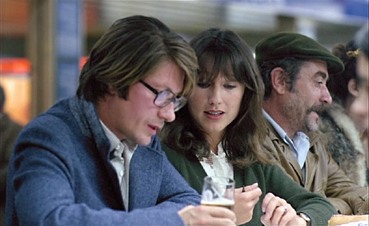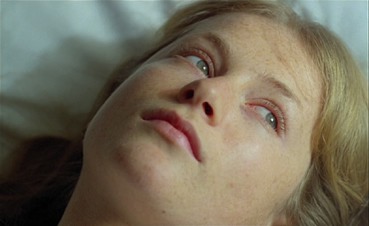|
For
Jean-Luc Godard, Slow Motion marked a return
to commercial features after several years of Marxist-inspired
experimentation, two of which were em spent making films that were never
shown or completed, and a further four working almost exclusively
with video and the documentary form. Amidst the euphoria
of the more positive reviews for Slow Motion
could be detected a few small sighs of relief, that Godard
had returned to making films about people rather than ideas,
that experimentation was working in partnership with communication,
rather than in disregard of it.
The
title, Slow Motion, is an English one that
does not even attempt to translate the original French –
Sauve qui peut (la vie) is actually better
served by the American title of Every Man for Himself,
though even that was missing the tellingly bracketed 'la
vie', or 'life', which is a central theme
of the story. The English title reflects the director's
use of step-printed slow motion at particular points in
the film, often at moments of significant emotional response,
whether they be happiness, conflict, fear, pain or recognition
– the technique invites us to focus on the moment, on the
faces and the feelings of the characters, on how they are
affected by what is happening or what they are seeing.

The
narrative revolves around three characters who are all facing potential
lifestyle changes and whose connection to each other becomes
clearer and as the film progresses: Paul (Jacques Dutronc)
is a television director who is separated from his wife and daughter,
whom he sees only once a month; Denise (Nathalie Baye) works
for the same television company as Paul and has recently ended
a relationship with him, and now plans a move to the country
to become a writer; Isabelle (Isabelle Huppert) is a country
girl who works as a prostitute in the city, and is looking
to move out of her shared flat and possibly her chosen occupation.
There is no all-explaining set-up here – Godard drops us
into the middle of the stories and leaves us to piece the
information together, and doing so provides one of the film's
principal pleasures. Indeed, immediately after my first
viewing of the film I felt compelled to run it again, knowing
full well that there would be little moments and indicators
in the first third that meant nothing until I was aware
of how the inter-relationships of the characters would later
play out.
The
film is divided into chapters: 'Life' (inaccurately subtitled
here as 'Run for your life'), 'The Imaginary', 'Fear', 'Trade'
and 'Music'. Each of these deals with aspects of modern
living, partly in metaphorical terms but most directly in
how they affect the three main characters. Thus Isabelle,
having been introduced in the previous section with the
pick-up "Do you want to see a film?" (which itself
should raise a smile with cineastes), does not really feature
as a character until we reach 'Trade', in which she is paid
for her services, threatened into knowing her place in the
commercial hierarchy by gangsters, and ordered about by
a client who is the very essence of the sort of power that is both fuelled and
corrupted by wealth. A chance meeting offers her a possible
way out via an old friend, but the job itself appears to
involve no actual work, just traveling to distant destinations,
staying for a while and returning, a comment perhaps on
the increasingly vacuous nature of executive work in the
commercial world. I say 'perhaps' because, as often with
Godard, clear explanations are rarely forthcoming. Similarly
suggestive and enigmatic are the shots of a busy shopping
street dominated by a C&A department store, which serve
no obvious narrative purpose, but intercut with the business
between client and prostitute, the inference is at the
very least interesting. And you can read whatever you like
into the moments when individual characters hear music that
no-one else is aware of, which is given a more visual realisation
in the final shot.
That the character of Paul shares the director's surname
and that he works in television (a medium for which Godard,
the Jean-Luc version, worked in the late 70s) inevitably
suggests an autobiographical slant. This is especially evident
when, asked to speak to a film class, he reads what sounds
very much like a quote from Godard himself, in which he
states that he makes movies primarily to pass the time.
Whether this autobiographical element extends to Paul's
hostile attitude to his ex-wife and almost paedophilic observations
about his growing daughter's body is another matter entirely.

Moments
and images throughout are echoed elsewhere in the film through
different characters and locations. Literature and storytelling
cross over from character to character (at one point Denise
appears to be almost reading Isabelle's mind), and co-incidence
and chance play an engaging and believable part in the narrative
structure. There is even a sometimes Buñuelian sense
of comic observation, from the man who drives to the post-office
in a Formula One race car and the female farm worker who
demonstrates how to have fun with cows, to the client who
makes a business call whilst examining Isabelle's naked
behind. Godard's beloved literary references are also given
a Buñuelian twist, with the writer Margueritte
Duras quoted, played over the car stereo, and referred to
as being just off screen, but never shown.
Despite
the sometimes multi-layered soundtrack and some deliberately
abrupt cuts from music to natural sound, Godard's technique
is far less experimental than in his 70s films. He
relies very much here on the skills of his actors, with
lingering shots of faces that again focus our attention
on the thoughts and feelings of his characters, beautifully
communicated by a fine cast on consistently impressive form.
Slow
Motion is a smart, sophisticated and rewarding
film from one of modern cinema's most important artists,
a treat for Godard fans and as good a way as any for the
uninitiated to discover his work.
Framed
at 1.66:1 and anamorphically enhanced, this
is a very nice transfer that shows no sign of its 25 year
vintage – contrast is nicely balanced, colours are strong
without over-saturation and detail is very good, with no
sign of obvious edge halos. A few minor dust and dirt marks
are occasionally visible, but do not distract in any way.
The
Dolby 2.0 mono soundtrack scores on clarity and is clear
of pops and distortion, and suits the film well – it doesn't
exactly cry out for a 5.1 remix.
Scenario
video Suave qui peut (la vie) (20:32) is a
French produced featurette in which Godard, in voice-over,
attempts to communicate his intentions regarding the script
and approach to the film, accompanied by close-ups of a
typewriter, the same three stills of the lead actors, and
a variety of footage not directly connected with the film
at all. It's all a bit esoteric, though there are interesting
bits here and there later on, so stick with it.
The
are also Biographies and Filmographies
for Jean-Luc Godard, Jacques Dutronc and Isabelle Huppert.
Nathalie Baye is conspicuous by her absence.
It
can take a little while to get into and start really connecting
the dots, but it's worth it. Slow Motion
is an involving and carefully crafted work that showcases
Godard's less experimental side to fine effect, and is both
an accessible and intellectually stimulating work.
Artificial
Eye's DVD is light on extras and the main one is not exactly
a model of clarity and direct communication (although intermittently
interesting for all that), but the picture quality is impressive,
and Godard fans should be well happy with that.
|